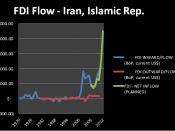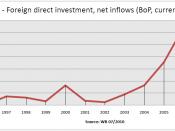Globalization is the integration of world economies (Questia, 2004). It affects productivity, imports and exports, technology and growth rates. Globalization has become identified with a number of trends, most of which have developed since World War II. These include greater international movement of commodities, money, information, and people; and the development of technology, organizations, legal systems and infrastructures to allow movement. More specifically, globalization refers to:
Increace in international trade at a faster rate than the growth in the world economy.
Increase in international flow of capital including foreign direct investment.
Greater transborder data flow, using such technologies such as the internet, comnmunication satellites and telephones.
Greater international cultural exchange, for example through the export of Hollywood and Bollywood movies.
Spreading of multiculturalism and better individual access to cultural diversity, with on the other hand, some reduction in diversity through assimilation, hybridization, Westernization, Americanization or Sinoization of cultures.
Erosion of national sovereignty and national borders through international agreements leading to organizations like the WTO and OPEC.
Greater international travel and tourism.
Greater immigration, including illegal immigration.
Development of global telecommunications infrastructure.
Development of global financial systems.
Increase in the share of the world economy controlled by multinational corporations.
Increase role of international organizations such as WTO, WIPO, IMF that deal with international transactions.
Increase in the number of standards applied globally; e.g. copyright laws.
Creation of local clusters of competence (Porters Clusters) having world wide competitive advantage. (encyclopedia.thefreedictionary, 2004)
Many of these trends are seen as positive by supporters of various forms of globalization, and in many cases globalization has been actively promoted by governments and other institutions. For example, there are economic arguments supporting globalization, such as the theory of comparative advantage suggesting that free trade leads to a more efficient allocation of resources, with all those involved...



Globalization = Democracy?
well thought out, just doesn't seem to run together, not sure you exactly got your point across, also i'd never end a paper with a quote.
0 out of 0 people found this comment useful.